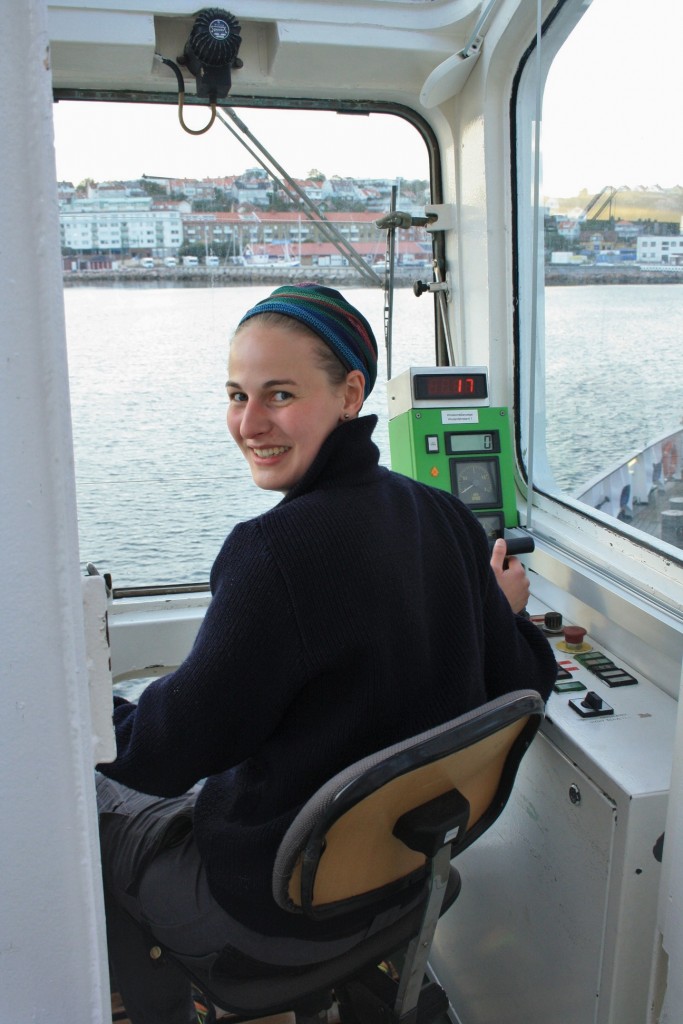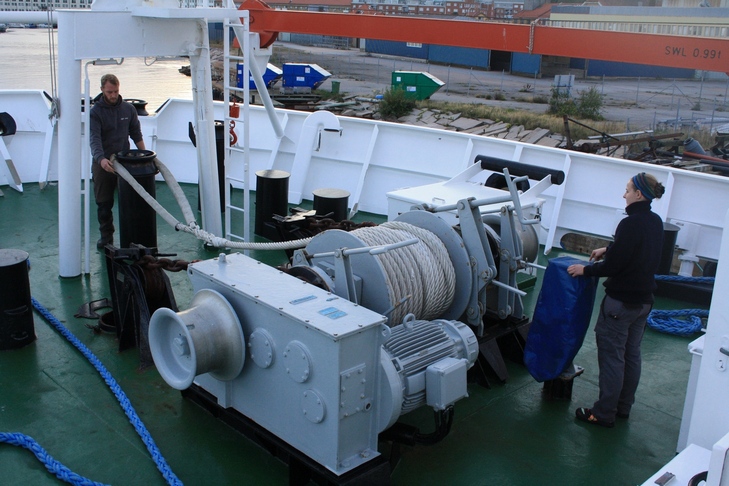When I was in Australia a couple of years ago, I booked a dive trip to the Great Barrier Reef. I arrived at the given time at the pier and because the instructor was late, I started a second little breakfast – I ate a banana. A guy showed up with a grin on his face and said, “now I can’t take you with me on the dive anymore since you eat a banana.” Maybe you can imagine my surprise. Apparently, bananas mean bad luck on a ship (although I couldn’t find a reference for this myth anywhere). However, at the end of the day, I was lucky and had a very nice dive experience.
Wherever he got the banana story from that women are supposed to bring bad luck to a ship is common knowledge. You will probably think, at least this was the belief in former times, but Fenna (22) from Westerstede in Lower Saxony (Germany), a female ship mechanic on board of the Alkor, informed me that this belief still exists in the minds of some of her male colleagues.
I had a little chat with Fenna that I would like to share with you.
Me: Since when have you been interested in the work onboard and did you have anything do with seafaring before?
Fenna: I think it was in the 11th class of high school. There was the so-called Lions Club (http://e-clubhouse.org/sites/leerevenburg/) in Leer/Oldenburg (Germany) that came in our school and gave us kind of a career counseling. There I heard about the career path of a captain as well as nautical science as a study course. I had no previous experience with seafaring or ships.
Me: What is the official title of your profession?
Fenna: The title is ship mechanic.
Me: If you had no experience with being on a ship, what was your motivation for this career path?
Fenna: In general I would say that I was curious to do something different than most of my classmates who became teachers or studied natural science.
Me: (laughter) What is wrong with natural science? Biology is a fascinating field!!!
Fenna: (laughter) Just wasn’t the right choice for me. I wanted to do something more applied after school, instead of starting to study right away and that was the right choice for me.
Me: How about the training? Which positions onboard did you have to pass?
Fenna: The training lasts three years in total. You have practical training on the ship as well as theoretical block courses at school. In one part of the training, you are working as machinist, in the second part as sailor on deck and on bridge.
Most of my training I achieved on container vessels and onboard the Meteor.
Me: And how many girls were in your class?
Fenna: Just me and one other girl. Around 5 % of women are in the training to become sea mechanics. The number of actively working women in the job is even less.
Me: Do you think that the training and work onboard was/is sometimes harder for you because you are a girl?
Fenna: The training time was quite hard. Male colleagues that were supposed to teach me sometimes sent me to bed or told me that the work is too hard that I should better become a nurse or kindergarten teacher. I even heard the superstition that a woman means no luck onboard.
Me: How did you manage your training then?
Fenna: I was curious to learn. When they sent me to my cabin, I went back and told them that I want to be trained.
Me: So you are quite self-confident?
Fenna: I was persistent and I think, that is how I could convince most of my colleagues so far of my abilities and motivation.
Me: Have you ever been seasick and do you have a tip against it?
Fenna: Sometimes I have problems with seasickness, especially when I haven’t been onboard for a time. (Thinking) On my very first cruise I was very seasick. I kept myself busy on deck. As soon as you start to pity yourself and to isolate yourself then it is getting worse.
Me: How is your work onboard organized?
Fenna: We are working two times four hours per day. The boatswain is organizing us in shifts. We are working day- and nightshifts. This system is also rotating. Just the boatswain is working only during the day as well as the so-called day laborer. Usually, he also works just during the day.
Me: And what are your duties?
Fenna: On a research vessel, you work the machines used for research. We also keep the common rooms clean and the vessel well maintained. We have to clean the rust off, do some welding, painting and so on.
Me: What was the nicest place you have been to and the longest time on sea?
Fenna: The longest time on sea was five months and the nicest place… (thinking). I liked Mauritius and Japan. The people there are very nice.
Me: What would you say are the greatest challenges working on a ship
Fenna: The greatest challenge is probably that you just have the ship and can’t go anywhere else. (Thinking) And the crew. The most challenging is probably the crew and the captain. The atmosphere onboard strongly depends on the captain and his leadership.
On ships, you still have a strong hierarchy and the daily life is very structured, which was great for me after school. Moreover, the crew always changes. This cruise is for me the first one where I already know most of my colleagues. Otherwise, you always have to get used to new colleagues and you always have to prove yourself.
Especially on container vessels, the working environment is different. Often, the equipment isn’t in a good condition like the protective clothing and the people work more hours. Dangerous situations may appear during work because colleagues are tired.
On the Alkor, the working environment is very good. We keep to our shifts, the morality between the colleagues is good and everybody watches out for each other’s safety.
Me: Since we have the chat in your cabin, I see that you have one for yourself. Do you always have a cabin for yourself?
Fenna: Since another colleague left the ship, I have a cabin for myself. Before, I shared the cabin with my colleague Benny.
Me: I would suggest this as my last question and thank you very much for agreeing to this interview and that you answered very open minded.
Fenna: Of course.
Me: Do you sometimes miss girl talk?
Fenna: (laughter) I always found someone to talk to on the cruises. Sometimes, I would like to exchange more with other female colleagues about their experiences onboard.
Blogger: Angela Stippkugel, Master student of Biological Oceanography at GEOMAR

